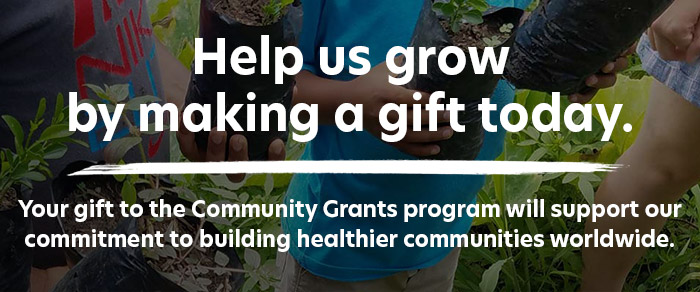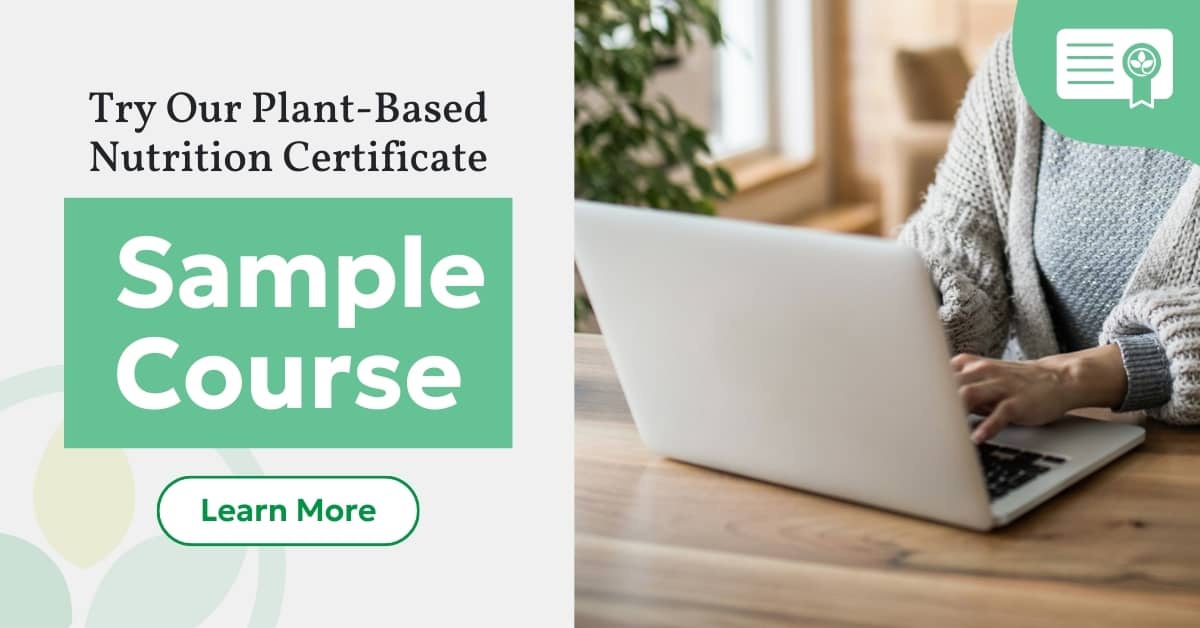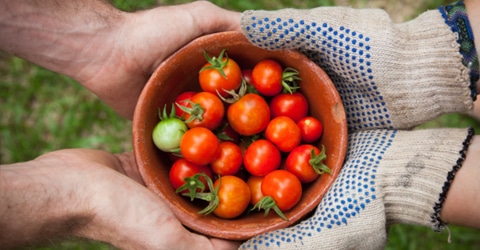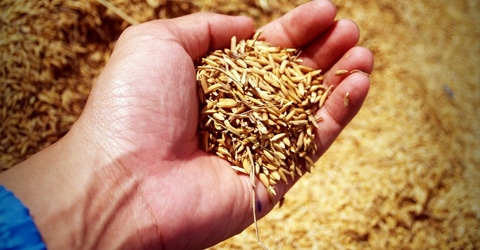
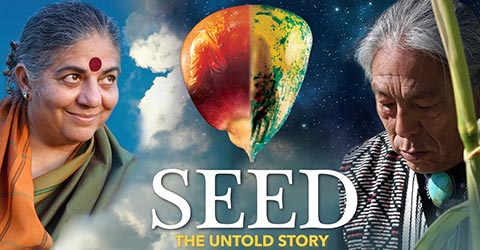
When the credits rolled at the end of SEED: The Untold Story, I was shocked, amazed, and terrified all at the same time. This award-winning documentary directed by Taggart Siegel and Jon Betz tells the story of the planet’s most powerful resource: seeds. Today, we might think of seeds in a peripheral way: sesame seeds sprinkled on a burger bun or the packet of tiny black specks we get from big box stores to grow tomatoes in the summer. Our modern society has lost knowledge of and appreciation for the critical role seeds play in our survival. Without seeds, our lives would be impossible. Nearly every civilization since the beginning of agriculture has relied on seeds to prosper. The threats to this invaluable resource are widespread and alarming. Here are five seed-related crises our planet is facing:
1. Biodiversity Crisis
The strength of any ecosystem is dependent on its biodiversity,[1] which fosters resilience and longevity[2]. Yet over 90% of our historic fruit and vegetable varieties are now extinct[3]. And while there are still 30,000 different edible plants, 90% of the world’s calories come from only 15 crops and 60% from just three crops: corn, rice, and wheat[4]. An overreliance on one variety of food increases crops’ vulnerability to disease and threatens food supplies. However, throughout history, large-scale agribusinesses never learned this lesson. The potato famine in Ireland was the result of growing a single variety of potato[2], while the Southern Corn Leaf Blight of the 1970s resulted from an overreliance on one type of seed[5]. Unless we prioritize biodiversity, global food supplies will be in jeopardy and we may not survive.
2. Ancestry Crisis
Can you think of a food that holds special meaning to your family and culture? As a Chinese American, it’s definitely rice for me. For many Native American tribes, corn is sacred seed. It was first cultivated by Native Americans over 7,000 years ago in what is now Mexico. As people migrated north and south, they took these seeds with them, knowing that if they had seeds, they could survive[1]. Louie Hena, a member of the Tesuque and Zuni Pueblos in New Mexico, says as he proudly looks at stalks of corn, “This is my grandmother, my grandfather, my mom, my dad, my brother, my sister, my kids, my grandkids and myself. We all are one.”[1]
These varieties aren’t the sweet, plump yellow cobs we eat at barbeques. They’re varieties that generations of Native Americans have used for food, ceremonies and other cultural practices. The seeds embody the history of their ancestors, and saving seeds is an act of preservation of the past and an investment for the future.
Our modern society has lost knowledge of and appreciation for the critical role seeds play in our survival. Without seeds, our lives would be impossible.
3. Sovereignty Crisis
Genetic modification of seeds has serious ramifications for how we view the ownership of life itself. Corporations like Monsanto tweak the DNA of seeds and patent these genetically modified organism (GMO) seeds as intellectual property that they can sell; and if you own the seeds you also own the fruit. Not suprisingly, those GMO seeds are suicide seeds, meaning that they cannot be saved and replanted for the next harvest[6]. So, farmers become dependent on buying them year after year, while paying the seed “owners” a portion of their profits[7]. Environmental activist Vandana Shiva asserts that Monsanto has perpetuated a cycle of selling their seeds, removing alternatives, and driving up production costs for farmers[7][9]. Ultimately, farmers around the world are losing sovereignty over their practices and the products of their work[7]. Between 1995–2012, over 300,000 farmers in India took their own lives due to indebtedness to seed corporations[8].
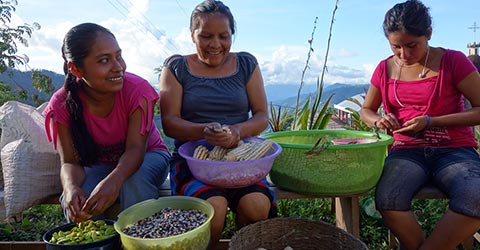
4. Health Crisis
While the health effects of eating GMO foods are still debated[10], the environment in which they are grown is toxic. GMO crops are engineered to withstand higher amounts and potencies of pesticides and herbicides[11], and the farmers applying those chemicals are exposed daily[12]. The pesticide glyphosate, the active ingredient in Roundup, has been deemed a “possible carcinogen” by the World Health Organization[13]. In a 2020 class-action lawsuit, Bayer, owner of Monsanto and Roundup, paid $10 billion to 95,000 individuals for cases of cancer linked to the deadly pesticide[14]. And while many countries in Europe have restricted the use of GMO seeds[15] and harsh chemicals such as Roundup[16], the US has yet to require standardized labelling of foods that contain GMO ingredients[17]. As a result, our people are left clueless and sick.
5. Environmental Crisis
The promise that high-yield GMO seeds are feeding the world falls apart when we see that these crops are used mainly to make ethanol fuel, fatten livestock, and bulk up junk foods[18][19]. A loss of diversity in our seeds and what we grow is destroying the planet today. Industrial, monoculture farms treat the land not as a complex ecosystem, but as a fuel-intensive “crop factory.”[20] Artificial fertilizers quickly increase nutrients in depleted soil, but in the long term, they degrade soil quality and pollute our water and air[21].
While SEED: The Untold Story informs the audience about these global crises resulting from a loss of seed biodiversity, the documentary also provides practical and empowering actions we can all take. I implore you to watch the film, or at least read through their free discussion guide, to learn how we can all preserve and pass on these invaluable seeds.
References
- Siegel T, Betz J. SEED: The Untold Story.; 2016.
- Fraser EDG. Social Vulnerability and Ecological Fragility: Building Bridges between Social and Natural Sciences Using the Irish Potato Famine as a Case Study. Conservation Ecology. https://www.jstor.org/stable/26271945?seq=1#metadata_info_tab_contents. Published December 2003. Accessed November 8, 2020.
- Tomanio J. Dwindling Food Variety. National Geographic. https://www.nationalgeographic.org/media/infographic-design/. Published 2011. Accessed November 8, 2020.
- Rutledge K, Ramroop T, Boughdreau D, et al. Food Staple . National Geographic. https://www.nationalgeographic.org/encyclopedia/food-staple/. Published February 22, 2011. Accessed November 8, 2020.
- Bruns HA. Southern Corn Leaf Blight: A Story Worth Retelling. Agron J. 2017;109(4):1-7. https://www.ars.usda.gov/ARSUserFiles/60663500/Publications/Bruns/2017/Bruns_2017_Corn Leaf Blight.pdf. Accessed November 9, 2020.
- Shiva V. The Seeds Of Suicide: How Monsanto Destroys Farming . Asian Age Glob Res. April 2013. https://www.globalresearch.ca/the-seeds-of-suicide-how-monsanto-destroys-farming/5329947. Accessed October 11, 2020.
- Shiva V. The future of food: Countering globalisation and recolonisation of Indian agriculture. Futures. 2004;36(6-7):715-732. doi:10.1016/j.futures.2003.12.014
- Mishra S. Farmers’ Suicides in India, 1995-2012: Measurement and Interpretation.; 2014. www.lse.ac.uk/asiaResearchCentre. Accessed November 8, 2020.
- Thomas G, De Tavernier J. Farmer-suicide in India: debating the role of biotechnology. Life Sci Soc Policy. 2017;13(1). doi:10.1186/s40504-017-0052-z
- Norris ML. Will GMOs Hurt My Body? The Public’s Concerns and How Scientists Have Addressed Them . Science in the News. http://sitn.hms.harvard.edu/flash/2015/will-gmos-hurt-my-body/. Published August 10, 2015. Accessed November 8, 2020.
- Hsaio J. GMOs and Pesticides: Helpful or Harmful? . Science in the News. http://sitn.hms.harvard.edu/flash/2015/gmos-and-pesticides/. Published August 2015. Accessed November 8, 2020.
- EPA. Agricultural Worker Protection Standard (WPS). United States Environmental Protection Agency. https://www.epa.gov/pesticide-worker-safety/agricultural-worker-protection-standard-wps. Published 2020. Accessed November 8, 2020.
- IARC. IARC Monograph on Glyphosate . World Health Organization. https://www.iarc.fr/featured-news/media-centre-iarc-news-glyphosate/. Published 2015. Accessed November 8, 2020.
- Cohen P. Roundup Maker to Pay $10 Billion to Settle Cancer Suits – The New York Times. New York Times. https://www.nytimes.com/2020/06/24/business/roundup-settlement-lawsuits.html. Published June 24, 2020. Accessed November 8, 2020.
- Papademetriou T. Restrictions on Genetically Modified Organisms: European Union . Law Library of Congress. https://www.loc.gov/law/help/restrictions-on-gmos/eu.php. Published March 2014. Accessed November 8, 2020.
- Hessler U. What′s driving Europe′s stance on glyphosate . DW. https://www.dw.com/en/whats-driving-europes-stance-on-glyphosate/a-53924882. Published June 25, 2020. Accessed November 8, 2020.
- Neal Jr. AL. National Bioengineered Food Disclosure Standard. Washington DC; 2020. https://federalregister.gov/d/2018-27283,. Accessed November 8, 2020.
- Bayer. Research to Feed the Growing Global Population. Bayer. https://www.bayer.com/en/innovation/research-in-agriculture. Published October 13, 2020. Accessed November 9, 2020.
- USDA. USDA Coexistence Factsheets – Corn. Washington DC; 2015. www.usda.gov. Accessed November 9, 2020.
- UCSUSA. Hidden Costs of Industrial Agriculture | Union of Concerned Scientists. Union of Concerned Scientists. https://www.ucsusa.org/resources/hidden-costs-industrial-agriculture. Published August 24, 2008. Accessed November 9, 2020.
- Massah J, Azadegan B. Effect of Chemical Fertilizers on Soil Compaction and Degradation . Agric Mech Asia, Africa, Lat Am. 2016;47(1):44-50. https://www.researchgate.net/publication/303568416. Accessed November 9, 2020.
Copyright 2026 Center for Nutrition Studies. All rights reserved.
Deepen Your Knowledge With Our
Plant-Based Nutrition
Certificate
Plant-Based Nutrition Certificate
- 23,000+ students
- 100% online, learn at your own pace
- No prerequisites
- Continuing education credits
